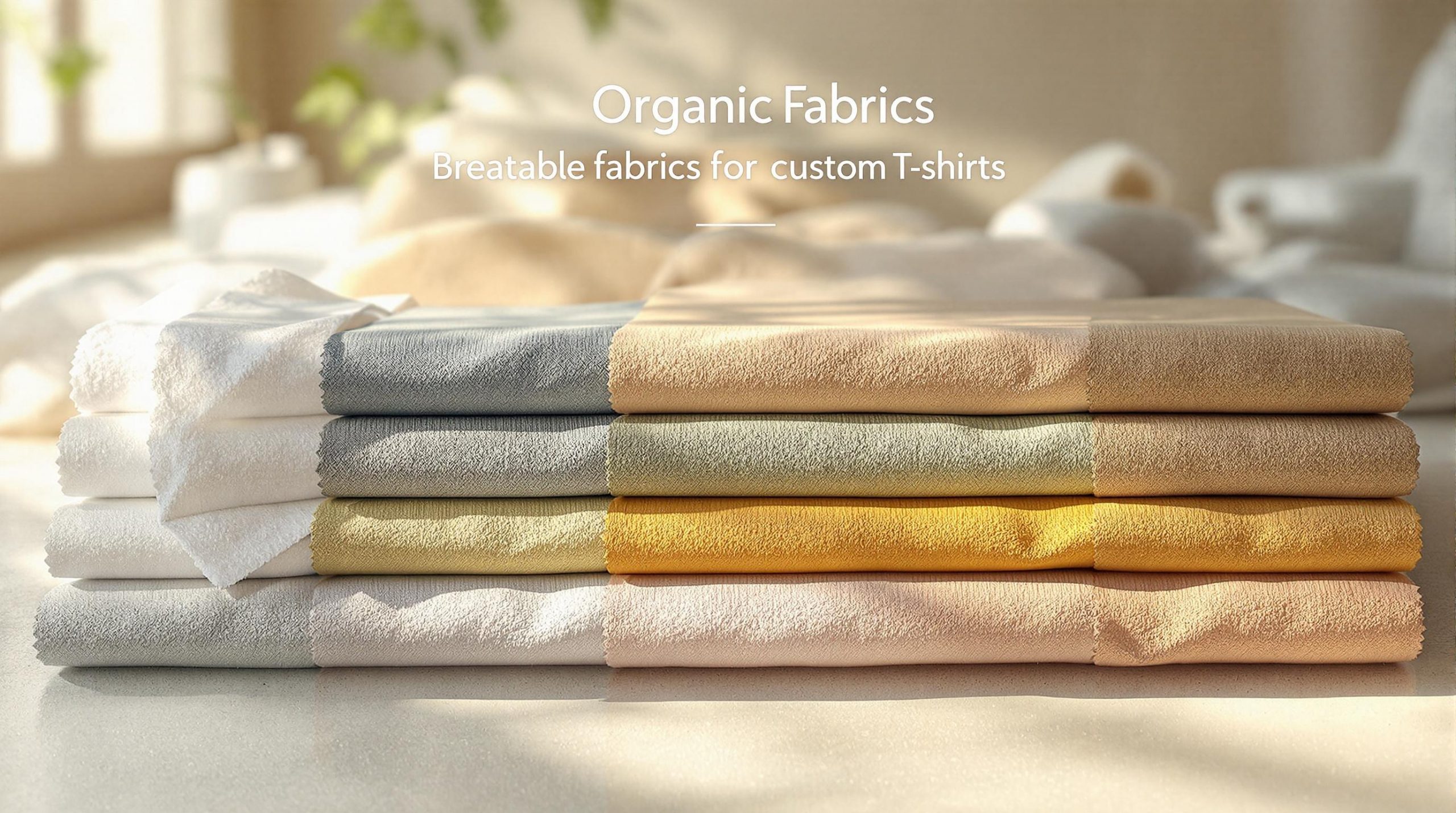Looking for the best eco-friendly fabrics for custom t-shirts? Here’s a quick guide to the top 7 organic materials and how they compare:
- Organic Cotton: Soft, breathable, and easy to print on. Perfect for everyday wear.
- Hemp: Durable, UV-resistant, and antimicrobial. Great for long-lasting designs.
- Bamboo: Hypoallergenic, moisture-wicking, and silky. Ideal for sensitive skin.
- Organic Linen: Cooling and durable, softens over time. Best for hot weather.
- Tencel/Lyocell: Smooth, wrinkle-resistant, and eco-conscious. Offers a luxury feel.
- Modal: Stretchy, colorfast, and lightweight. Perfect for athletic wear.
- Organic Wool: Temperature-regulating, odor-resistant, and durable. Best for performance and outdoor activities.
Quick Comparison Table
| Fabric Type | Best For | Key Features | Care Level |
|---|---|---|---|
| Organic Cotton | Everyday wear | Soft, breathable, easy to print on | Low |
| Hemp | Durability | Strong, UV-resistant, antimicrobial | Medium |
| Bamboo | Sensitive skin | Moisture-wicking, silky texture | Medium |
| Organic Linen | Hot weather | Cooling, softens with use | High |
| Tencel/Lyocell | Luxury feel | Drapes well, eco-conscious production | Medium |
| Modal | Athletic wear | Stretch recovery, holds color well | Medium |
| Organic Wool | Performance | Regulates temperature, resists odors | High |
Each fabric offers unique benefits depending on your needs, from breathable cotton to performance-focused wool. Choose based on intended use, climate, print compatibility, and care requirements. For more details, keep reading!
The Best Organic T-shirt options.
1. Organic Cotton
Organic cotton is grown without synthetic pesticides or GMOs, making it a more environmentally conscious choice compared to regular cotton. It also provides a smooth surface that’s ideal for printing.
At ooShirts, custom t-shirts made with organic cotton showcase detailed and vibrant artwork thanks to advanced printing techniques. Whether you’re creating apparel for an eco-conscious brand or your personal collection, organic cotton stands out as a reliable and high-quality option. Up next, let’s look at hemp fabric for custom t-shirts.
2. Hemp
Hemp is a standout choice for custom t-shirts, known for its eco-friendly nature and long-lasting strength. Made from the stalks of the Cannabis sativa plant, it uses minimal water and avoids pesticides, making it a smart option for reducing environmental impact.
This fabric offers great color retention and ensures that printed designs stay vibrant over time. Whether you’re using screen printing or digital printing, hemp provides a reliable surface for intricate designs.
Hemp t-shirts come with practical perks too. They naturally block UV rays and have antimicrobial properties, which help keep odors at bay – even after extended use. Plus, they’re easy to care for.
These t-shirts resist shrinking and hold their shape through multiple washes, keeping the design intact. The natural texture of hemp adds a premium touch that enhances any design.
Brands like ooShirts highlight how hemp t-shirts combine style with practical benefits. While pure hemp fabric may feel rough at first, blending it with organic cotton balances hemp’s durability with cotton’s softness. Up next: bamboo – a fabric with its own eco-conscious advantages for custom t-shirts.
3. Bamboo
Bamboo fabric has become a popular option for custom t-shirts, offering a mix of comfort and environmentally friendly advantages. Made from bamboo pulp – a fast-growing plant that doesn’t require pesticides – it also uses less water compared to traditional cotton.
This fabric is great for printing because it holds ink well, ensuring sharp, long-lasting designs. Its tight weave helps prevent ink from bleeding, so your designs stay clear and intact even after multiple washes. But bamboo isn’t just about print quality – it also performs exceptionally well as a material.
Bamboo naturally regulates temperature and wicks away moisture, keeping you cool in hot weather and cozy when it’s cooler. It’s also built to last, meaning your designs stay vibrant despite frequent wear. Plus, the fabric is incredibly soft, making it comfortable to wear all day.
For those with sensitive skin, bamboo is a great choice. It’s hypoallergenic and helps control odors, thanks to its natural antibacterial properties. Even after repeated use, it stays fresh and comfortable.
From an environmental perspective, bamboo is a standout. It grows quickly and produces a high yield of fiber compared to other crops, making it a more sustainable choice.
At ooShirts, bamboo t-shirts are celebrated for their softness and eco-conscious appeal. Whether your design is simple or complex, this fabric delivers. Up next, we’ll take a closer look at the unique advantages of organic linen.
sbb-itb-1cc5ba6
4. Organic Linen
Organic linen, made from flax grown without chemicals, stands out for its texture and durability. This fabric is known for maintaining its shape and structure over time, making it a reliable choice for long-lasting t-shirts. Plus, its ability to hold prints beautifully makes it perfect for detailed designs.
Thanks to its natural ability to regulate temperature, organic linen is a go-to for warm weather. It can absorb up to 20% of its weight in moisture before feeling damp, keeping you comfortable even in humid conditions.
The fabric’s tight weave and smooth surface allow for crisp and vibrant prints, while its natural texture adds a handcrafted feel. Over time, organic linen softens with washing but still keeps its structure and print quality intact.
For those mindful of environmental impact, organic linen is a smart choice. Flax plants require minimal water – only 6–8 inches of rainfall – and can grow in less fertile soil, making it a resource-efficient option for custom apparel.
At ooShirts, organic linen t-shirts are a popular pick for summer collections and outdoor events. The fabric’s resistance to dirt and stains, along with its ability to stay fresh, makes it a practical option for activewear and promotional items that need to look polished.
5. Tencel/Lyocell

Tencel/Lyocell is a fabric made from wood pulp cellulose, produced through a closed-loop process that recycles solvents and uses less water compared to traditional cotton. This method makes it a more eco-conscious option for custom t-shirts.
The fiber structure of Tencel/Lyocell includes tiny channels that improve moisture management, keeping you comfortable in different conditions. Its smooth surface and ability to regulate temperature naturally ensure a fresh, comfortable feel even during extended wear. This moisture control also creates a perfect base for custom printing.
When it comes to printing, Tencel/Lyocell offers vibrant color retention and sharp designs. The dense fibers allow for clear, bold prints that stay intact even after multiple washes. Plus, the fabric’s subtle sheen adds a touch of elegance to printed designs without looking overly shiny.
The long fibers in Tencel/Lyocell help prevent pilling, maintain the garment’s shape, and keep the fabric soft and silky – comparable to high-end cotton.
For custom t-shirt projects that prioritize both comfort and eco-friendliness, Tencel/Lyocell is a standout choice. Its biodegradable nature ensures that garments naturally decompose at the end of their lifecycle, reducing long-term environmental impact.
At ooShirts, for instance, Tencel/Lyocell t-shirts are a popular choice for corporate events and wellness brands that value premium quality alongside environmental responsibility. The fabric’s natural drape and wrinkle resistance also make it ideal for professional settings where both style and comfort matter.
6. Modal

Modal is made by spinning reconstituted beech tree pulp, combining qualities of both natural and synthetic fibers to offer softness and durability.
One of its standout features is its strong resistance to wear and tear, even when wet. This ensures t-shirts retain their shape after multiple washes, making modal a great choice for custom apparel that’s worn regularly.
The fabric’s fine structure gives it a smooth surface, ideal for custom printing. Both digital and screen printing techniques work exceptionally well on modal, producing sharp, vibrant designs. Its consistent texture and ability to absorb color efficiently contribute to this. Additionally, the fabric has a subtle sheen that enhances printed designs without making them overly glossy. This print-friendly nature aligns perfectly with modal’s overall functionality for everyday wear.
Modal is also great at managing moisture, helping to keep the wearer dry during active use.
Its natural drape and wrinkle resistance ensure that t-shirts look neat throughout the day. Combined with its silky feel, lightweight nature, and breathability, modal offers a luxurious wearing experience. These features, along with its environmentally friendly production, make it an appealing option.
For eco-conscious buyers, modal has clear advantages. Beech trees used in its production require little irrigation and can grow in less fertile soil. Plus, the manufacturing process uses a closed-loop system that recaptures most chemicals, reducing its environmental footprint.
At ooShirts, modal t-shirts are increasingly popular for custom orders where a premium feel is desired. Boutique fashion brands and high-end promotional merchandise often choose modal for its compatibility with printing methods and its long-lasting quality, ensuring custom apparel stays appealing over time.
7. Organic Wool
Organic wool is a top-tier natural fiber for custom t-shirts, especially for those prioritizing performance and durability in their clothing. Although less common than cotton or synthetic blends, it brings distinct qualities that make it perfect for specific t-shirt uses.
This fiber is naturally crimped, creating air pockets that help regulate temperature. That makes organic wool t-shirts a great choice for outdoor activities where conditions can change throughout the day.
The wool is sourced from sheep raised without synthetic pesticides, ensuring ethical farming practices and minimal processing to retain its natural properties.
Organic wool t-shirts also stand out for their ability to hold vibrant prints. However, printing requires specialized inks and careful temperature management to achieve the best results.
The fiber’s natural elasticity helps garments retain their shape even after multiple wears, while its antimicrobial properties fight odors, reducing the need for frequent washing.
Another bonus? Organic wool can absorb up to 30% of its weight in moisture while still wicking sweat away from the skin, making it a solid option for performance-focused apparel.
Caring for organic wool t-shirts is straightforward but specific: cold water washing and air drying are key to preserving the material’s qualities and extending its lifespan. While the upfront cost may be higher than other organic fabrics, the durability and performance often make it a worthwhile investment for specialized needs.
For brands focused on outdoor gear or premium athletic wear, organic wool offers a standout mix of temperature regulation, moisture management, and long-lasting shape retention. It’s a go-to choice for those looking for something functional and eco-conscious. Next, check out our Summary for a quick look at all these sustainable fabric options.
Summary
Here’s a quick guide to help you decide on the right fabric for your needs:
| Fabric Type | Best For | Key Features | Care Level |
|---|---|---|---|
| Organic Cotton | Everyday wear | Soft, breathable, easy to print on | Low |
| Hemp | Durability | Strong, UV-resistant, antimicrobial | Medium |
| Bamboo | Sensitive skin | Moisture-wicking, silky texture | Medium |
| Organic Linen | Hot weather | Cooling, softens with use | High |
| Tencel/Lyocell | Luxury feel | Drapes well, eco-conscious production | Medium |
| Modal | Athletic wear | Stretch recovery, holds color well | Medium |
| Organic Wool | Performance | Regulates temperature, resists odors | High |
When choosing a fabric, consider these factors:
- Intended Use: Think about how and where the fabric will be used.
- Climate: Some materials perform better in specific weather conditions.
- Print Compatibility: Certain fabrics handle prints better than others.
- Care Requirements: Look at maintenance needs and how long the fabric will last.
If you’re ready to create custom designs, ooShirts makes it easy. Design and print organic t-shirts starting at just $3.51 per shirt using their user-friendly online design lab. Choose between screen printing and digital printing for flexible options.
While organic fabrics may cost more upfront, their durability and quality make them a smart investment over time. Partnering with skilled printers ensures your designs stay vibrant and your fabrics remain in great shape.
